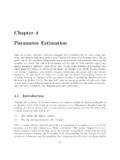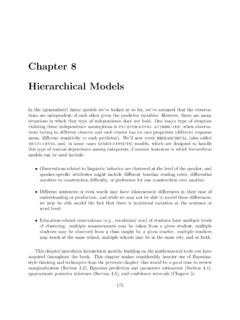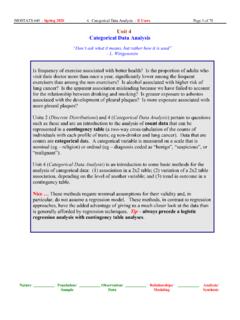Transcription of Ambiguity and Misunderstanding in the Law
1 Ambiguity and Misunderstanding in the Law Sanford Schane * "The law is a profession of words." 1 By means of words contracts are created, statutes are enacted, and constitutions come into existence. Yet, in spite of all good intentions, the meanings of the words found in documents are not always clear and unequivocal. They may be capable of being understood in more ways than one, they may be doubtful or uncertain, and they may lend themselves to various interpretations by different individuals. When differences in understanding are irresolvable, the parties having an interest in what is meant may end up in litigation and ask the court to come up with its interpretation. In the eyes of the law, when this kind of situation arises, the contract or the legislative act contains " Ambiguity ". Paradoxically enough, the word Ambiguity itself has more than one interpretation. One of the senses, what I call the general meaning, has to do with how language is used by speakers or writers and understood by listeners or readers.
2 Ambiguity occurs where there is lack of clarity or when there is uncertainty about the application of a term. It is this sense of Ambiguity that generally is meant within the law. The other sense, the restricted meaning, is concerned with certain lexical and grammatical properties that are part of the very fabric of language, irrespective of anyone's usage or understanding. A word may have multiple definitions or a group of words may partake of more than one grammatical parsing. Linguists and grammarians have extensively investigated these features of language. I shall analyze three court cases claimed to contain " Ambiguity " or "ambiguous words".2 The claims are appropriate for the general meaning of these terms. Otherwise, the three cases of so-called " Ambiguity " turn out to be quite different. One of them exemplifies the restricted meaning of Ambiguity , whereas the other two present problems of reference and of vagueness. I shall discuss these differences of Misunderstanding and show that they played a role in how the cases were decided.
3 I. Three cases with so-called " Ambiguity " The first case , Frigaliment Importing Co. v. International Sales Corp.,3 gets embroiled in the definition of a chicken. Buyer, a Swiss company, has ordered * Research Professor of Linguistics, University of California, San Diego. Wayne State University; University of Michigan; Massachusetts Institute of Technology. Liberal Arts Fellow, Harvard Law School. 1 This is the opening sentence in David Mellinkoff's monumental work, The Language of the Law, Little, Brown & Co., Boston: 1963. 2 Frigaliment Importing Co. v. International Sales Corp.; Raffles v. Wichelhaus; Interstate Commerce Commission v. Kroblin. 3 190 ( (1960). Schane Ambiguity and Misunderstanding in the Law 2 frozen eviscerated chickens from a New York wholesaler of poultry. The order called for chickens of two sizes: 1 - 2 pounds, and 2 - 3 pounds.)
4 When the shipment arrives in Europe, Buyer discovers that the larger birds are all stewing chickens. Expecting broilers and fryers, Buyer cries "foul" and brings suit against Seller for breach of contract. The issue before the court becomes: "what is chicken?" 4 The plaintiff buyer contends that "'chicken' means a young chicken, suitable for broiling and frying."5 The defendant insists that a chicken is "any bird of the genus that meets contract specifications on weight and quality, including what it calls 'stewing chicken'."6 Judge Friendly, who heard the case , concedes that both meanings are possible. Consequently, he declares that "the word 'chicken' standing alone is ambiguous" (emphasis added),7 and he decides to look to the contract to see whether it offers any aid for the interpretation of this word. The second case , Raffles v. Wichelhaus,8 is notoriously known to law students. The bizarre events of this English case took place in 1864, before there were telegraphs, telephones, or e-mail.
5 The buyer purchased bales of cotton that were to be sent from Bombay, India to Liverpool, England on a ship called the "Peerless". At the time of the making of the contract it was unbeknown to the parties that there were two different ships by the name of "Peerless". One of them was to leave Bombay in October, the other in December. The buyer expected the goods to be on the October ship, whereas the seller planned to place them on the December vessel; neither of them was aware of the other's intent. When the October Peerless arrived in England, naturally there were no bales of cotton on it for the buyer. When the December Peerless sailed in to port with the shipment, the buyer refused acceptance. Seller then brought suit against Buyer. Counsel in support of the defendant buyer's plea noted that "there is nothing on the face of the contract to shew [sic] that any particular ship called the 'Peerless' was meant; but the moment it appears that two ships called the 'Peerless' were about to sail from Bombay there is a latent Ambiguity (emphasis added).
6 " 9 4 Frigaliment. The legal issue, of course, is whether the seller supplied the buyer with the goods that the buyer had ordered. 5 Frigaliment. 6 Frigaliment 7 Frigaliment 8 2 Hurl. & C. 906, 159 Eng. rep. 375 ( ). 9 Raffles Schane Ambiguity and Misunderstanding in the Law 3 The third case , Interstate Commerce Commission v. Allen E. Kroblin, Inc.,10 once again deals with eviscerated chickens. This time we find the ICC against farmers in a heated dispute over whether dressed and eviscerated chickens are manufactured products. One of the roles of the ICC is to certify trucking companies engaged in interstate commerce, and most goods that are transported between states must be carried by these certificated or regulated carriers. However, there is an exemption for certain agricultural commodities, such as fruits and vegetables, fish, ordinary livestock, and agricultural commodities that are not manufactured products.
7 11 Thanks to this exemption, farmers are able to use less costly uncertificated conveyances for moving agricultural goods from state to state. The ICC claims that dressed and eviscerated poultry is a manufactured product, whereas the Department of Agriculture maintains that it is an agricultural commodity. The Court notes that "all parties are agreed that the words 'agricultural commodities' and 'manufactured products thereof' used in the agricultural exemption are ambiguous words" [emphasis added]. 12 Here then are three cases claimed to contain ambiguous words. But exactly what is meant by " Ambiguity "? II. Two definitions of " Ambiguity " The term Ambiguity has more than one interpretation: a highly general sense that pertains to language use, and a more restricted meaning that deals with some fundamental properties about language itself. For the general sense, let us look at the following definitions found under the entries " Ambiguity " and "ambiguous" within the legal reference work, Words and The words "ambiguous" and " Ambiguity " are often used to denote simple lack of clarity in "Ambiguous" means doubtful and 10 113 599 ( , 1953) 11 Section 203(b)(6) 12 ICC 13 Words and Phrases, Vol.
8 3, Westfield Publ., St. Paul, Minn., 1953. 14 Universal Credit Corp. v. Daniel, 243 2d 154, 157, 150 (Words and Phrases (p. 440): 15 Osterholm v. Boston and Montana Consol. Copper and Silver Mining Co., 107 , 502, 40 (Words and Phrases, p. 440) Schane Ambiguity and Misunderstanding in the Law 4 The word "ambiguous" means capable of being understood in more senses than one; obscure in meaning through indefiniteness of expression; having a double meaning; doubtful and uncertain; meaning unascertainable within the four corners of the instrument; open to construction; reasonably susceptible to different constructions; uncertain because of susceptible of more than one meaning; and synonyms are "doubtful", "equivocal", "indefinite", "indeterminate", "indistinct", "uncertain", and "unsettled".16 It is the general usage of the word Ambiguity that is common to the three cases. There is a contract for the sale of chickens but it is unclear what kinds of chickens are called for; there are two boats with the same name but it is indeterminate as to which one was to carry bales of cotton; and there are deplumed and eviscerated chickens to be transported but it is uncertain whether they are to be classified as manufactured products.)
9 The general meaning that is attributed to the term Ambiguity has to do with language use with what has been said and with how it is understood. Lawyers and legislatures (as well as ordinary citizens) ideally should use language that is clear, certain, unequivocal, and to the point, and but when it is unclear, uncertain, doubtful, or equivocal, then language is considered to be "ambiguous". Opposed to this general view of Ambiguity is a more restricted meaning. It is this restricted sense that typically finds expression in grammatical treatises and in the field of linguistics. Linguistics, as a discipline, studies the properties of human language. One of the truly fascinating aspects of language is the potential for Ambiguity . We find two principal types: lexical Ambiguity , and syntactic or structural Ambiguity . Lexical Ambiguity potentially occurs whenever a word has more than one objective or dictionary meaning. The Ambiguity is potential because it is only in certain contexts that more than one of the meanings may be possible.
10 For example, the word bank can refer to a financial institution or to the edge of a river or stream. The sentence "I'll meet you at the bank at three o'clock", written or uttered in isolation, is ambiguous between the two meanings. Yet, most of the time we are unaware of any Ambiguity , and in fact, we find none because other linguistic features from elsewhere in the discourse, or even nonlinguistic clues, render only one of the readings as possible. Thus, if I had said, "I'll meet you at the bank at three o'clock because I have to go there to cash a check," the meaning to be attributed to the word bank is quite unambiguous. Or if we had planned to go fishing, and later on you see me walking to my car with a fishing pole over my shoulder, and I say to you, "I'll meet you at the bank at three o'clock," you probably would infer that our rendez-vous is to take place at the river bank. But when there are neither linguistic nor situational features to help out, the Ambiguity could be very real.












